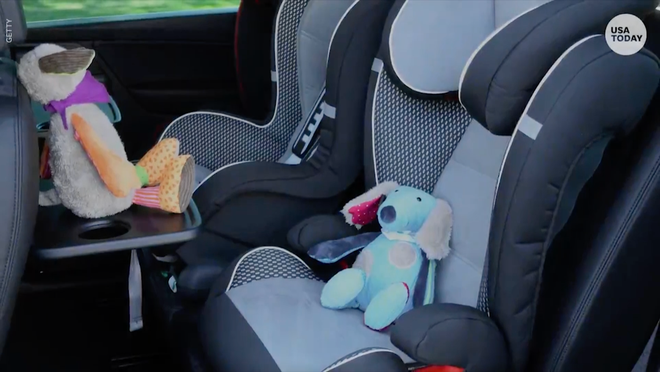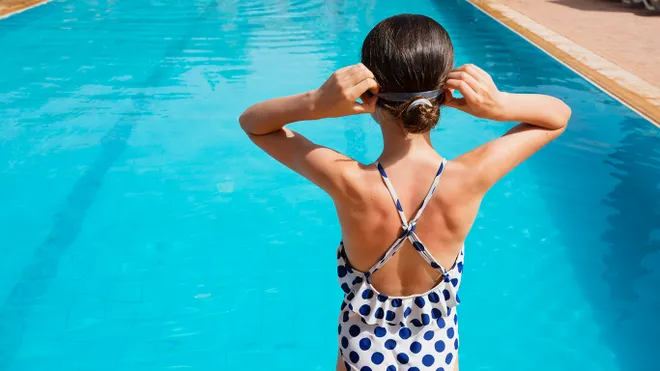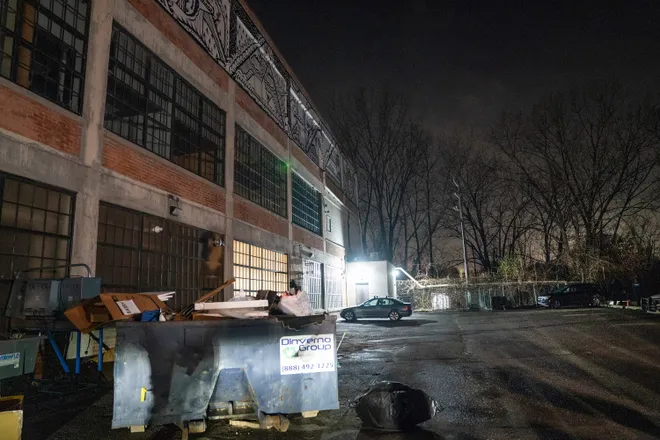Well-meaning parents kill thousands of kids each year due to mistakes. What can be done?
A Long Island grandmother forgot to drop her granddaughter off at daycare before heading to work on a hot summer day. A football player in Tampa Bay who didn't see his two-year-old daughter run into a swimming pool. A mother who struck her six-year-old daughter with a boat's propeller at Lake Pleasant in Arizona. An adult who owned a rifle in a home where two kids were playing with play Nerf guns in Alaska.
In each case, a child died while under their parent or guardian's watch - tragedies that are becoming an all-too-familiar American horror story.
“People tend to be very judgmental when something like this happens and they try to make monsters out of parents,” said Jannette Fennell, the founder of the national nonprofit organization Kids and Cars Safety. "They feel like if they make a monster out of them, then this thing won’t happen to them. But this can and does happen to anybody.”
Simple unintentional injury leading to child deaths, in most cases, doesn't lead to criminal charges or jail time. Often, prosecutors elect not to file charges because there is no criminal intent - as well as the stark reality that losing a child from an accident is often considered punishment enough.
But experts wonder if there is a way to prevent such deaths - or at least, make parents pay more attention to their children.
Each year in the United States, thousands of children lose their lives due to a mistake or faulty memory of otherwise responsible parents. The legal term is called "unintentional injury" that occurs without intent of harm or purpose. And even when prosecutors decide to pursue charges, the decision is based on whether purposeful negligence can be proven, and the jail sentences are often short, experts said.
Many advocates for child safety told USA TODAY the deaths can be prevented with solutions as simple as added safety measures in cars, restrictions on who accesses guns and swim lessons for young kids. Yet the roadblocks to get there have been a massive undertaking to overcome.
Meanwhile, children across the nation are left vulnerable each year. And there's no national uniformity for how the cases are handled by law enforcement. Prosecutors and police said that arrests and charges vary among cases across the country, even in those with similar circumstances to one another.
In what cases have children died of unintentional injury?
More than 9,400 children and teenagers died from unintentional injuries, including "motor vehicle crashes, suffocation, drowning, poisoning, fires, and falls" in 2021, according to CDC data.
Several children this summer have died at the hands of parents or guardians.
- Hot cars: A 14-month-old child died in Smithtown on Long Island in a hot car when her grandmother forgot to take her to daycare and left her in a car seat, police said. After working for eight hours, the woman drove to pick the child up from daycare before she realized the child was still in a car. The toddler was taken to a hospital and pronounced dead. There was no arrest made in the case and an investigation is ongoing, according to Suffolk County Police.
About fifteen children – ranging from the ages of five-months-old to four-years-old – have died this year after being left in a hot car, according to the National Safety Council. More than 1,054 children have died in hot cars since 1990, according to a database of the deaths compiled by Kids And Cars Safety. The states with the highest number of deaths of kids between 1990 and 2022 include Texas (146), Florida (111), California (65), Arizona (47), Louisiana (44) and North Carolina (44.)
Heat waves have made it more dangerous.14 children have died in hot cars in 2023.

- Firearms: On July 30 in Alaska, a young child killed another child with a rifle while the two were playing with Nerf guns at a home in Mountain Village. Alaska State Troopers Spokesman Austin McDaniel told the Anchorage Daily News the child found the rifle in the home. Authorities declined to tell the outlet the ages of the children. "No charges will be filed in this tragic accident," said McDaniel to USA TODAY.
At least 85 people have died as a result of unintentional shootings by kids in 2023, according to a database from the activist, nonprofit organization Everytown for Gun Safety. Another 156 have been injured.
- Boats: In late July at Lake Pleasant in Arizona, a 6-year-old girl died in a boating accident when she was struck by her mother who was driving the boat. There hasn't been an arrest made nor charges filed, and an investigation into the case is ongoing, said Sgt. Joaquin Enriquez, a spokesman for the Maricopa County Sheriff's Office.
Thousands of boating accidents lead to fatal outcomes for children each year. Of the 636 total people who died from boating accidents last year, 54 of them were children and teens, according to data from the U.S. Coast Guard.
Girl, 6:The latest child to die or be injured in boating accidents this summer across US
- Swimming pools: In early May in Tampa, Florida, the 2-year-old daughter of a Tampa Bay Buccaneers linebacker Shaquil Barrett died in a family swimming pool after she fell inside. There haven't been any charges filed, said Erin Maloney, a spokesperson for the District Attorney's office.
Data from the Center for Disease Control and Prevention shows drowning is the most common reason for death among children who are 1 to 4-years-old. And it's the second cause of death behind car crashes for kids and teenagers who are 5 to 19-years-old. The CDC estimates there 4,000 unintentional drownings across the nation per year, and that the fatalities are more common during the summer.

How often are unintentional injury cases prosecuted?
Although cases of unintentional injury leading to the death of children can be similar, they vary widely when it comes to prosecution. The likelihood of prosecution often depends on whether the death happened under the watch of a parent or caretaker and the ability to determine malicious intent, experts said.
“Each case is fact-specific and doesn’t really allow for a blanket policy on how all of these cases should be handled," said Amy Clausing, a spokesperson and assistant prosecuting attorney for the Hamilton County Coroner’s Office, about child deaths due to unintentional injury.
Clausing recalled a Cincinnati, Ohio case last summer of a mother who slept next to her six-week-old child and suffocated the boy while they were sleeping, almost a year after her six-week-old daughter died under similar circumstances. Brooke Hunter, the mother, was indicted for involuntary manslaughter and child endangerment in October 2022.
“At the time of the first incident, Hunter was advised of the dangers of co-sleeping. Because of the prior incident, the Hamilton County Coroner’s Office ruled the second child’s death a homicide,” Clausing said.
A 2023 data analysis from the nonprofit organization Kids and Cars Safety looked at 1,051 hot car deaths since 1990. It shows that more than half of cases “do not result in a conviction,” while about one-third “result in a conviction of varying degrees." And the "overwhelming majority of hot car deaths do not involve abuse, neglect, or prior history with CPS, drugs or alcohol," the group reports.
“Many defendants take a plea deal to avoid the possibility of jail time and because they are unable to fight a legal battle after the tragic loss of a child,” the report found. “The legal outcomes of hot car deaths vary drastically even between cases with nearly identical circumstances."
In the case of hot car deaths, about 53% are caused by parents failing to see their child in the backseat - often because of changes to the parent's typical daily routine that disrupts their brain pattern and leads to memory failure, said David Diamond, a psychology professor at the University of South Florida.
Guardians and parents are protected by the legal notion of "mens rea," Latin for "guilty mind," which refers to criminal intent. Typically, for an offender to be determined guilty, prosecutors must prove beyond a reasonable doubt that the defendant had a culpable state of mind, Diamond said in a 2021 report.
The aftermath of grief: 'The parent's parenting may be called into question'
Aside from anxieties about the involvement of the law, a parent or caretaker who unintentionally kills a child is left with the grief and further repercussions of the loss. Those can include isolation and an array of emotions from loved ones.
Dr. Gail Saltz, a clinical associate professor of psychiatry at the New York Presbyterian Hospital at the Weill-Cornell School of Medicine, said that to a parent, losing a kid “is really the most stressful thing that can happen to a person."
Grieving for one's child becomes even more complicated for parents who lose the support of friends and family after their child's death.
“There may be other people who either directly or indirectly amplify the [parent’s] guilt," said Deborah Carr, a professor of sociology at Boston University. “The parent’s parenting may be called into question, even if there’s no basis for that questioning.”

What prevention efforts are there? And how can parents keep kids safe?
Several advocacy organizations have lobbied for legislation that would create solutions and save kids who are at risk every year. Many said they face roadblocks from legislators and the companies that make potentially deadly products – including cars and guns – involved in tragic deaths.
Fennell and her organization Kids and Cars Safety for decades has pushed for legislation to make cars safer and offered tips to help parents remember when they have a child in the car.
Fennell advises parents to always check the backs of their cars before walking away and ensure that visual reminders of the child's presence - such as the child's diaper bags or sweater - are in the front seat. Parents should also set up agreements with their daycare to notify them if the child doesn't show up, she said.
On swimming pool deaths, counties and states are leading initiatives to address water safety and to provide free or subsidized swim lessons to low-income children.
In 2014, a group of nonprofits and governmental organizations formed an initiative called Water Safety USA and this year published an action plan with nearly 100 recommendations to achieve water safety.
Experts from the American Academy of Pediatrics encourage parents to securely fence swimming pools on all four sides and ensure the fence is at least four feet high, with no opening under it.
At swimming pools, especially during parties or gatherings, adults should designate a 'water watcher' who is in charge of keeping an eye on all children in and near the pool, the group recommends. And tubs, buckets and above-the-ground pools filled with water should not be left unattended and should be drained immediately after use, according to the group.
Gun prevention advocates, including the nonprofit Everytown for Gun Safety, have lobbied for effective firearm safety.
"It’s not just the child who’s injured or killed who is affected by these incidents," said Annie Andrews, an associate professor in the Department of Pediatrics at the Medical University of South Carolina in a summer 2021 conversation with Everytown, according to the organization's website. "It’s their siblings and their cousins and their parents and their entire community."
The group, in conjunction with the nonprofit organization Safe Kids Worldwide, recommends that Americans prevent tragedies by "secure(ing) all guns in their home and vehicles," "model(ing) responsible behavior around guns," and "ask(ing) about the presence of unsecured guns in other homes."
Contributing: Adrianna Rodriguez, Thao Nguyen, Grace Hauck, USA TODAY; Associated Press
Contact Kayla Jimenez at kjimenez@usatoday.com. Follow her on Twitter at @kaylajjimenez.
Disclaimer: The copyright of this article belongs to the original author. Reposting this article is solely for the purpose of information dissemination and does not constitute any investment advice. If there is any infringement, please contact us immediately. We will make corrections or deletions as necessary. Thank you.







